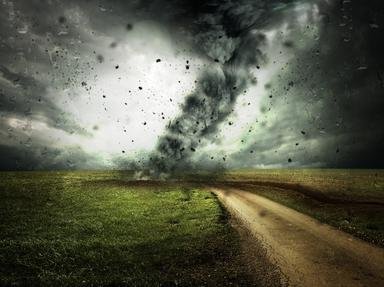Quiz Answer Key and Fun Facts
1. On Sunday 11th October 1987 the weather forecast for the week ahead, known as the Farmer's forecast, predicted stormy weather over most of the UK. After watching the weather patterns this was downgraded by mid-week to what?
2. Unfortunately, an area of depression, i.e. low pressure, was developing over the Bay of Biscay. What do such areas usually form under?
3. At 6:30 am on Thursday 15th October 1987, gale warnings were issued for the English Channel. At 10:30 am these were upgraded to what?
4. Michael Fish, the weather forecaster on the BBC 1:00 pm News, reassured the viewers and told them that the expected strong winds were heading west and would dissipate over the Atlantic Ocean.
5. The depression from the Bay of Biscay was gradually deepening and creeping north-eastwards, and at 10:35 pm, force 10 winds were forecast. Shipping warnings were sent out by radio at 12:30 am on the 16th October 1987. What time were the emergency services alerted to the possibility of problems over the land?
6. The south east of England was the worst affected area with winds in some places of up to 120 mph (190 km/h). Why were no higher speeds recorded?
7. Eighteen people died in England during the hurricane and the aftermath, including two firemen on a rescue mission. Why do the experts say that this was, thankfully, a low number?
8. Why was the weather report made by Michael Fish shown in a short sketch during the opening ceremony for the London 2012 Olympics?
9. Which country, apart from England, was badly affected by the hurricane of 1987?
10. Technically, a hurricane is the name given only to a tropical cyclone.
Source: Author
zippolover
This quiz was reviewed by FunTrivia editor
bloomsby before going online.
Any errors found in FunTrivia content are routinely corrected through our feedback system.

